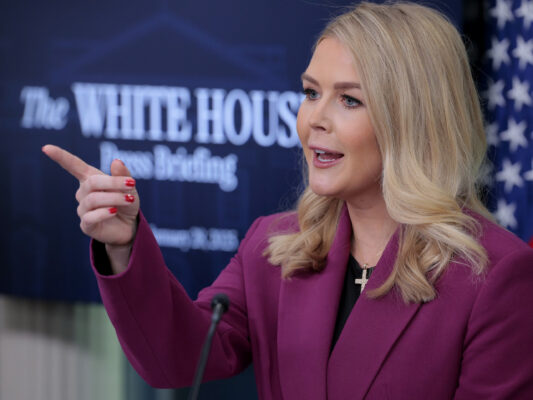Bold Stance – Why Is the White House Snubbing Pronoun Reporters?
OPINION: This article may contain commentary which reflects the author's opinion.
Bold Stance – Why Is the White House Snubbing Pronoun Reporters?
On April 9, 2025, the White House dropped a bombshell that’s sent shockwaves through the press corps and beyond. Press Secretary Karoline Leavitt, the voice of President Donald Trump’s administration, declared a new policy with a single, jaw-dropping line: “As a matter of policy, we do not respond to reporters with pronouns in their bios.” It’s a bold stance—some call it audacious, others outrageous—and it’s sparked a firestorm of debate. Why is the White House snubbing reporters over something as simple as “he/him” or “they/them” in an email signature? The answer is a tangled mix of politics, ideology, and a calculated jab at the media, and it’s shaking up Washington like never before.
Let’s set the scene. It’s spring 2025, and Trump’s back in the Oval Office, riding a wave of GOP dominance after sweeping Congress and the presidency. The administration’s flexing its muscle—tariffs are spiking, agendas are rolling, and the culture wars are blazing hotter than ever. Enter Leavitt, a 27-year-old firebrand who’s become the face of Trump’s press strategy. On April 8, she briefed reporters outside the West Wing, all smiles and steel. But by the next day, she’d drawn a line in the sand that’s got everyone talking. Reporters with pronouns in their bios—those little markers of identity like “she/her” or “he/they”—are now persona non grata. No replies, no answers, no access. Zip.
Why this move, and why now? Leavitt didn’t mince words when pressed by a New York Times reporter. “Any reporter who chooses to put their preferred pronouns in their bio clearly does not care about biological reality or truth,” she said, doubling down in a separate statement, “and therefore cannot be trusted to write an honest story.” It’s a gut punch to the growing norm of pronoun-sharing, a practice that’s spread across newsrooms, universities, and corporate America as a nod to inclusivity and gender identity. For Leavitt and the Trump team, though, it’s a red flag—a signal of “woke” ideology they’ve vowed to stamp out. This isn’t just a press policy; it’s a declaration of war on a cultural shift they despise.
The roots run deep. Trump’s long mocked pronouns—back in July 2024, he told Fox News, “I don’t want pronouns,” quipping, “Nobody even knows what that means.” His base ate it up, and now, with power consolidated, the administration’s turning that disdain into action. In January 2025, federal workers were barred from listing pronouns in government emails, part of a broader executive order slashing transgender protections. The Air Force tried a similar ban, only to back off when it clashed with the 2024 National Defense Authorization Act. Leavitt’s policy feels like the next step—a public flex aimed straight at the media, a group Trump’s long branded as “the enemy.” X posts today buzz with conservative cheers—“Finally, some sanity!”—while liberals cry foul, one suggesting a “pronoun spam” revolt.
But how’s it playing out in the briefing room? Picture this: a reporter from a major outlet, pronouns proudly displayed in their email sig, fires off a question about Trump’s latest tariff hike—104% on Chinese imports, announced this week. Crickets. No response. Another tries to ask about the Associated Press ban (just lifted by a judge after Trump’s “Gulf of America” spat). Silence. It’s not random—it’s deliberate. The White House isn’t just dodging; it’s snubbing with purpose. Some reporters are testing the waters—one from Crooked Media added pronouns to an email and got ghosted, proving the policy’s real. Others, like a Washington Post scribe, slipped through the cracks, suggesting enforcement might still be patchy.
The backlash is fierce. Critics call it petty, discriminatory, even unconstitutional. “This is a press secretary weaponizing access to punish identity,” one journalist fumed on X. Democrats pounced—Senate Minority Leader Chuck Schumer might weave it into his “chaos” narrative, already hammering Trump’s tariff flip-flops. The left sees it as a chilling signal: conform or be cut off. Meanwhile, conservatives hail it as a stand for “truth.” Leavitt’s logic—pronouns equal bias—resonates with a base that’s spent years decrying “fake news.” On X, one user crowed, “If you can’t handle biology, why should we trust your reporting?” It’s a sentiment Trump’s team is banking on.
What’s the strategy here? It’s classic Trump playbook—provoke, polarize, dominate. By snubbing pronoun reporters, the White House isn’t just flexing control over the narrative; it’s picking a fight it knows will rally its faithful. The media’s a ripe target—trust in journalists is low, and this paints them as out-of-touch elitists. It also distracts. While the press fumes over pronouns, Trump’s pushing tariffs, meeting Netanyahu, and planning a military parade for June. Leavitt’s move keeps the spotlight on culture, not policy missteps—like the Dow’s wild swings or Elon Musk’s reported tariff pleas. It’s a shiny object, and it’s working.
But it’s not without risk. The press corps isn’t powerless—outlets like the Times and Axios are already digging, and a united front could turn this into a First Amendment showdown. A judge just forced the White House to reinstate AP reporters after a two-month ban; could this spark another legal brawl? And what about the optics? Snubbing reporters over pronouns might thrill the base, but it could alienate moderates who see it as mean-spirited. X reflects the split—some call it “based,” others “childish.” If it backfires, Leavitt’s bold stance could become a liability.
For reporters, it’s a gut check. Pronouns have become a badge of progressive bona fides—think “she/her” at NPR or “they/them” at Vox. Now, that choice could lock them out of the biggest story in town. Some might strip their bios to stay in the game; others might double down, daring the White House to blink. It’s a personal call with professional stakes, and it’s unfolding in real time. One X user mused, “Wonder how many will cave?” The answer could shape who gets the scoop—and who gets shut out.
Where’s this headed? Leavitt’s not backing down—she’s leaning in, framing it as a truth-or-consequences stand. Trump’s likely loving the chaos; it’s his brand. But the press won’t roll over—they’ll adapt, resist, or escalate. By April’s end, we might see a full-on boycott, a lawsuit, or a quiet climbdown. For now, it’s a standoff, and the tension’s palpable.
Why the snub? It’s power, principle, and a middle finger to the “woke” media—all rolled into one. Want the full story—why Leavitt’s doubling down, who’s fighting back, and what’s next in this wild saga? Click here to dive into every detail, every angle, every secret laid bare!




